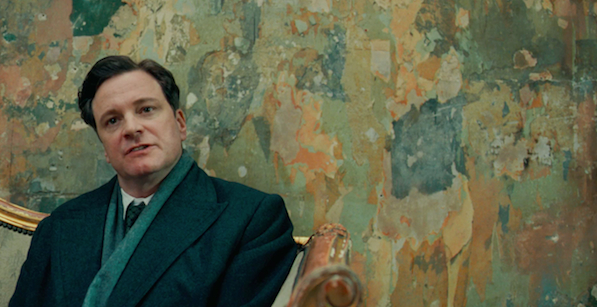
In a year dominated by outstanding lead female performances, the Best Actor competition has proven a rather straightforward affair, especially since – like so many other categories at this year’s Oscars – it boils down to a two-horse race between The King’s Speech and The Social Network. Certainly, of all the former’s 12 nominations, its lead performance by Colin Firth remains most deserving of accolades. But Firth’s regal stammering pales in comparison to a couple of other performances among his competition. Expect Firth to walk away with the gold… and then be remembered as merely the most tolerable component of a middling piece of sub-PBS pabulum. But who really deserves the statue?
Colin Firth, The King’s Speech
Tom Hooper’s royal drama about King George VI’s attempts to overcome a pesky stutter in the early years of his reign stands as one of the most overrated Oscar frontrunners ever. Still, if the film must be showered with huzzahs, Firth seems the most justified recipient. Though saddled with a protagonist who barely registers two dimensions – his one defining trait, the aforementioned cutesy verbal affliction, is the byproduct of a routine daddy issue – Firth never allows the character to devolve into caricature. Rather, he exudes an interior intensity and frustration that seems at constant war with the more public, staunchly regal façade he urgently seeks to maintain, lending the poorly helmed, bromantic comedy-ish proceedings a believably tortured center.
Grade: B-
Franco is a veritable one-man show in Danny Boyle’s drama about the terrifying real-life ordeal of Aron Ralston, who was trapped for days with his arm pinned under a remote canyon’s boulder. And yet at every turn, his performance is overwhelmed by the Slumdog Millionaire director’s hyperkinetic showmanship. Franco radiates compelling devil-may-care extreme-sports recklessness during the film’s Mountain Dew commercial-esque opening. Once saddled with the story’s more grim arm-amputation circumstances, however, the actor – despite being the only human on-screen for extended stretches – is relegated to an afterthought by Boyle’s incessant aesthetic-overload tumult, with any sense of his character’s terrifying isolation, fear and desperation subsumed beneath a tidal wave of spastic edits and look-at-me visual gestures.
Grade: B-
Like Franco, Bardem collaborated with a filmmaker whose prime interest is self-consciously calling attention to his own style, though whereas 127 Hours was merely mediocre, Alejandro González Iñárritu’s latest portrait of biblical-proportions globalized suffering was ridiculously risible. Credit then to Bardem, whose performance – as a father tormented from so many different angles that his tale plays like a stations-of-the-cross saga fit for Mel Gibson – is quiet, poignant and far more measured than Iñárritu’s garish direction. To instill authentic, tragic heart into a walking pin cushion of a character (who also sees dead people) is a triumphant feat, even if it’s ultimately yeoman’s work in service of overwrought mush.
Grade: B+
To reinvent any John Wayne role would seem foolhardy, and to take on Rooster Cogburn, the surly bounty hunter who netted Wayne his sole Best Actor Oscar, would seem an even greater challenge. From the moment the Coens’ camera tracks around a courtroom to finally arrive at Bridges’ eye patch-adorned lawman, however, the iconic part is his, all crotchety antagonism, moral resolve and no-nonsense violence. Bridges doesn’t shy away from the cartoonishness of Rooster but he nonetheless manages, in an early mercy killing and a late The Night of the Hunter-style nocturnal flight, to imbue his larger-than-life character with grave, gravely soul. It’s a performance that eschews Wayne’s Duke-isms and, in doing so, surpasses its predecessor in every respect.
Grade: B+

Despite David Fincher’s sleek direction and Aaron Sorkin’s rat-a-tat-tat dialogue, it’s Eisenberg who makes The Social Network thrum with electric, unsettling verve. As a fictionalized version of Facebook founder Mark Zuckerberg, Eisenberg – from his introductory verbal volleys with Rooney Mara’s Girl Who Got Away, to his final acts of personal and professional betrayal – conveys social-climbing smugness and class hierarchy-upending resentment. But more crucially, he captures a potent sense of the imposing and treacherous possibilities afforded by true genius. Eisenberg embodies his techno-geek with a blend of nebbish awkwardness and daunting ambition, arrogance and pettiness. In the process he creates what should – but, barring a significant upset, won’t – be this year’s trophy-winning lead male performance.
Grade: A-
Nick Schager is a film critic whose work regularly appears in The Village Voice, Time Out New York, Slant magazine and IFC News.







